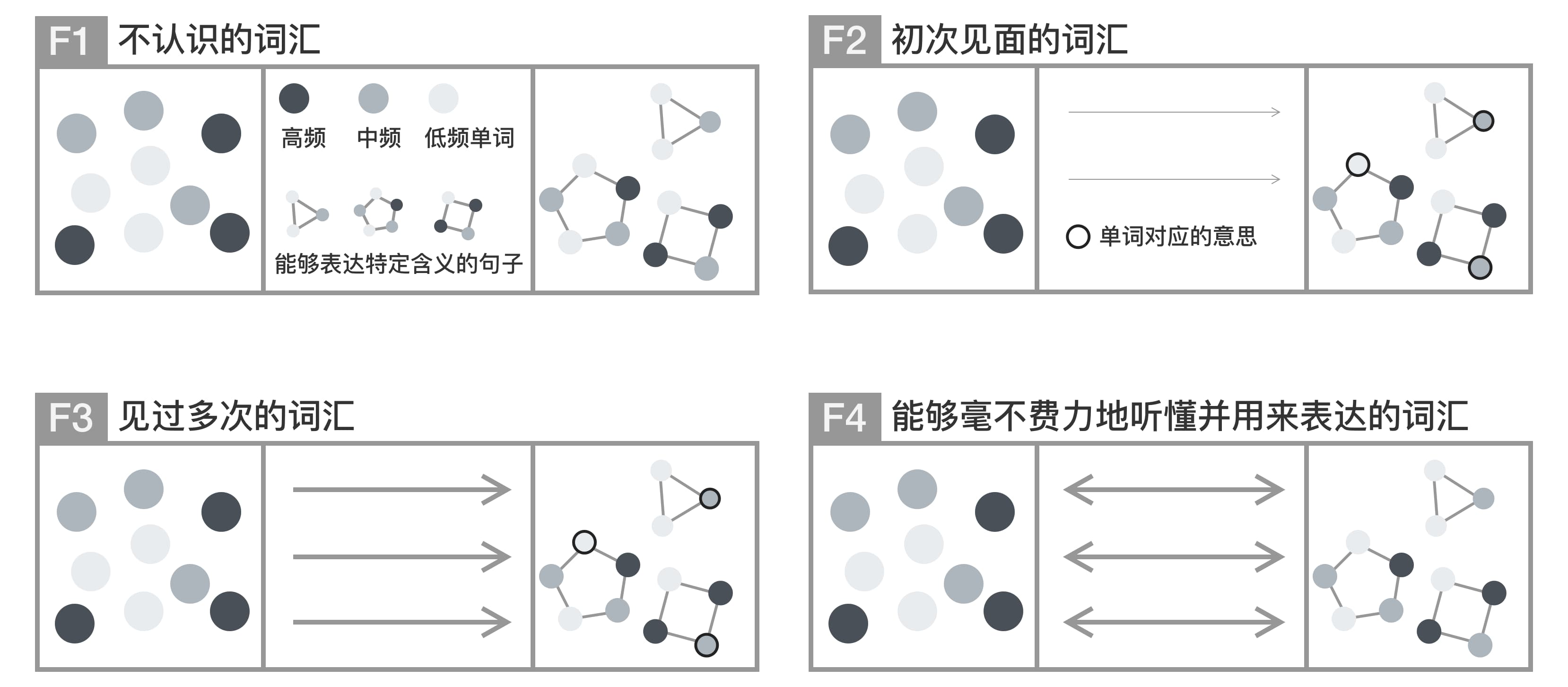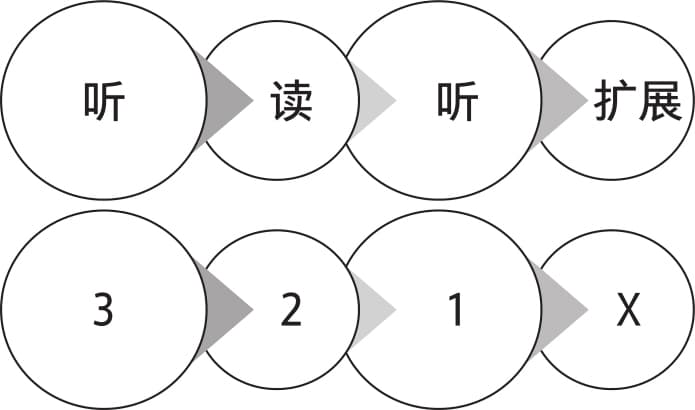这可能是每个想学好英语的人首先会问的问题,但似乎并没有被很好地解答。经过一番调研后,我试着给出自己对这个问题的理解。
首先要对「学好英语」有一个明确的定义,我对它的定义是:有一个足够大的词汇库,当文字或语音命中这些词汇时,可以不费力地 get 到意思,同时能够不费力地用这些词汇来表达(用正确的语法来叙事、表达感受等等)。

左边是词汇库,右边是有明确意思的完整的句子,中间的双向箭头表示:当别人提到这些词汇时可以知道对应的意思,当自己想要表达时,可以知道应该用哪些词汇。线的粗细表示这种 Effortless 的程度(线越粗越不费力)。
比如这句话:
Why are you guys yelling at us when we’re way upstairs?
如果对 yell 比较陌生,就不容易 get 到这句话想要表达的意思。如果对用 way 来表达程度不太熟悉,那么自己在造句时可能就会回到最熟悉的 too 或者 very 等词。
要让这个词汇库丰富起来,会经历四个步骤。分别命名为 F1, F2, F3, F4。

F1: 不知道它们存在的词汇。F2: 见过一次的词汇。F3: 多次遇见的词汇。F4: 可以被用来不费力表达的词汇。
要扩大 F3 的词汇库,比较有效的方式有两个:
- 大量、反复听/看合适的影视剧/书籍(大量、反复地听和看,除了扩充词汇,也是为
F4阶段的「不费力」打基础) - 用英语学习自己专业领域的内容(一箭双雕)
As more and more people get both information and entertainment through electronic media, researchers have also studied the extent to which vocabulary is learned through television (Peters & Webb, 2018) and through computer games (Cobb & Horst, 2011; Sundqvist & Sylvén, 2012). They have found that these resources can be effective in expanding vocabulary. More research in this emerging area should help to specify the nature and extent of vocabulary growth via exposure to electronic media. In the meantime, research has overwhelmingly confirmed that vocabulary growth will be limited if the learner does not also engage in focused vocabulary learning activities (Nation, 2001). Jan Hulstijn and Batia Laufer (2001) and others provide evidence that vocabulary development is more successful when learners are fully engaged in activities that require them to attend carefully to the new words and even to use them in productive tasks. Izabella Kojic-Sabo and Patsy Lightbown (1999) found that effort and the use of good learning strategies, such as keeping a notebook, looking words up in a dictionary, and reviewing what has been learned were associated with better vocabulary development. Cheryl Boyd Zimmerman (2009) provides many practical suggestions for teaching vocabulary and also for helping learners to continue learning outside the classroom.
— How Languages Are Learned
随着越来越多的人通过电子媒体获取信息和娱乐,研究人员还研究了通过电视(Peters & Webb,2018 年)和电脑游戏(Cobb & Horst,2011 年;Sundqvist & Sylvén,2012 年)学习词汇的程度。他们发现,这些资源可以有效地扩大词汇量。在这个新兴领域进行更多的研究,应该有助于确定通过接触电子媒体学习词汇的性质和程度。与此同时,研究表明,如果学习者不参与有针对性的词汇学习活动,词汇量将受到限制(Nation,2001 年)。Jan Hulstijn 和 Batia Laufer(2001 年)和其他人提供证据表明,当学习者完全参与需要他们仔细注意新单词甚至使用新单词的生产性任务的活动时,词汇发展更为成功。伊莎贝拉·科伊奇-萨博和帕齐·莱特布朗(1999)发现,努力和运用良好的学习策略,如记笔记、在字典中查找单词和复习学过的内容,与更好的词汇发展有关。谢里尔·博伊德·齐默尔曼(2009)为教学词汇和帮助学习者在课堂外继续学习提供了许多实用的建议。
影视剧可以提升听力(也可以通过字幕提升阅读能力),扩充中高频词库(日常对话,中高频的单词会多一些);书籍可以提升阅读能力(也可以通过音频提升听力),扩充中低频词库。「合适」不仅指素材本身要合适(比如「兄弟连」虽然很经典,但不太适合,因为频繁出现的枪炮声,容易出戏),还要贴合自己当前的 Level,也就是可理解输入(i + 1)。
词汇学习的要素
Vocabulary learning occurs because certain conditions are established which facilitate learning. These are repetition, noticing, retrieval, varied encounters and varied use, and elaboration. These learning conditions are themselves underpinned by two key factors:
- repetition, i.e. the number of encounters with each word.
- the quality of attention at each encounter.
The greater the number of encounters, the more likely learning is to occur; and the deeper the quality of the encounters, the more likely learning is to occur.
— How Languages Are Learned
词汇学习之所以发生,是因为建立了一些促进学习的条件,这些条件是重复、注意、检索、多样化的接触和多样化的使用以及详细阐述。这些学习条件本身受到两个关键因素的支持:
- 重复,即与每个单词的相遇次数
- 每次相遇时的注意力质量。
接触的次数越多,学习的可能性就越大;接触的质量越高,学习的可能性就越大。
Research suggests that there may be little difference in the efficacy of learning smaller and larger sets of words. Instead, they found that students learned most effectively when there was greater spacing between each encounter with the same words. From a practical perspective, this suggests that learning a larger number of words may be more effective than learning a smaller number, because if the words are studied in sequence, there is likely to be a greater amount of time between each word being encountered and studied.
— How Vocabulary is Learned
研究表明,学习较小或较大的单词集合的效率可能没有太大差别。相反,他们发现,当每次接触相同单词之间的间隔时间更长时,学生的学习效果最好。从实际的角度来看,这表明学习更多单词可能比学习更少单词更有效,因为如果按顺序学习单词,那么每次接触和学习单词之间的间隔时间可能会更长。
这是 How Languages Are Learned 和 How Vocabulary is Learned 这两本书中提到的关于学习新词汇的要点。 主要是「保持一定时间间隔的重复接触」和「注意力质量」。前者如果每天抽一定时间来听和读,那些中高频的词就有可能被多次遇到;后者表示遇到新单词时要留心,回忆是否之前遇到过,可能是什么意思,或者根据上下文猜测可能的意思,结合字典验证。同时也要有意识地去 Review 新单词。
如何有效地利用影视资料
这里引用《我在100天内自学英文翻转人生》这本书中,作者提到的方法:
第一步:关掉所有字幕观看第一遍
第二步:打开中文字幕观看第二遍, 确认之前没看懂的部分
第三步:换成英文字幕, 把刚才没听懂的片段抄下来
第四步:反复练习听不清楚的片段, 听完马上跟读
第五步:关掉所有的字幕,观看剩下的97次
这些步骤可以进行微调,比如第一步可以多听几遍;二、三可以合并为一步,直接开中英字幕;不一定要抄下来,可以打个标记;也不一定要听 100 遍。要达到的效果是,不光里面的对话能够完全听懂,而且几乎可以背下来。
如何有效地利用书籍和有声书
这里引用 《中国人英语自学方法教程》里提到的 321X 法:

假设《Elon Musk》这本书有 100 章,那么每一章先听 3 遍(觉得不够可以再多听几遍),接着读 2 遍(弄懂每一句意思和其中的生词),然后再听一遍。最后这个 X 是自主扩展,包括单词集中复习、跟读、背诵等等。
注重输出,完成 F3 -> F4 的转变
F4 和 F3 相比,最大的变化是那个反向箭头,也就是有了想表达的内容后,可以快速找到合适的词汇,并组装成正确的句子。这个过程主要靠输出,包括:写作、讨论、聊天。写作因为有斟酌的时间,原先那些被动接受的词就有机会被拿出来使用,面对面沟通需要即时反馈,使用的通常是最熟悉的词汇。
输出的目的是完成对词汇的 Retrieval(检索),使之能够在正确的场合下被使用。这个过程中如果有人能帮助指出其中的错误自然很好,但如果不能问题也不大。以下是 《How Languages Are Learned》这本书中的描述:
Research on learner beliefs about the role of grammar and corrective feedback in L2 learning confirms that there is often a mismatch between students’ and teachers’ views. In two large-scale studies, Renate Schulz (2001) found that virtually all students expressed a desire to have their errors corrected while very few teachers felt this was desirable. In addition, while most students believed that ‘formal study of the language is essential to the eventual mastery of a [foreign language]’ (p. 254), just over half of the teachers shared this belief. While this may seem surprising, it is consistent with a version of language teaching that is based on the hypothesis that L2 acquisition takes place through exposure to meaningful and comprehensible language. According to this view, explicit instruction and feedback on error play very limited roles.
关于学习者对语法和纠正性反馈在二语学习中作用的信念的研究证实,学生和教师的观点往往不一致。在两项大规模研究中,雷纳特·舒尔茨(2001)发现,几乎所有学生都表示希望纠正他们的错误,而很少有教师认为这是可取的。此外,虽然大多数学生认为“对语言进行正式学习对最终掌握(外语)至关重要”(第254页),但只有略超过一半的教师同意这一观点。虽然这似乎令人惊讶,但它与基于假设的语言教学是一致的,即二语习得是通过接触有意义和可理解的语言进行的。根据这一观点,对错误的明确指导和反馈作用非常有限。
还有一种 Retrieve 单词的方式是,主动翻译母语的表达(不一定要说出来),比如你问媳妇儿:一会要去超市吗?可以下意识地把它翻译成英文。慢慢地就会发现生活中其实很多场景都可以用来输出。
以上就是我觉得可以高效学习英语的方式,总结下主要是这几点:
- 输入 > 输出(尤其是词汇量还不太够,听力也比较吃力)
- 大量、反复地听、看、跟读、背诵合适(感兴趣且可理解)的材料(影视或书籍)
- 有意识地扩充词汇量
- 保持一定频率的输出
